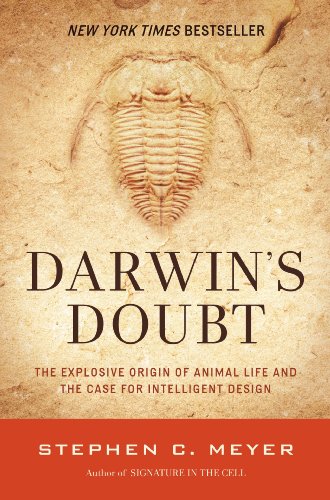Try Blinkist to get the key ideas from 7,500+ bestselling nonfiction titles and podcasts. Listen or read in just 15 minutes.
Start your free trial
Blink 3 of 8 - The 5 AM Club
by Robin Sharma

Darwin's Doubt by Stephen C. Meyer explores the theory of intelligent design and challenges Darwinian evolution. Meyer presents thought-provoking arguments and raises important questions about the origin of species.
In Darwin's Doubt, Stephen C. Meyer delves into the perplexing event known as the Cambrian explosion. This pivotal period in Earth's history, around 530 million years ago, saw the abrupt appearance of a diverse array of complex organisms in the fossil record. Meyer details how this phenomenon challenged Charles Darwin's theory of gradual evolution, which was based on a slow and steady process of natural selection acting on small, heritable variations.
As Meyer explains, the Cambrian explosion presents a 'geological' problem, as the sudden appearance of complex organisms contradicts the gradual evolution predicted by Darwin's theory. Furthermore, it presents a 'biological' problem, as the sudden appearance of complex body plans and unique structures challenges the classical neo-Darwinian mechanism of natural selection acting on random mutations.
Meyer then introduces the concept of biological information, emphasizing the role of DNA in encoding the instructions for building the proteins and structures that make up living organisms. He argues that the sudden appearance of complex body plans during the Cambrian explosion required an enormous amount of new biological information, raising the question of its source.
Building on this, Meyer posits that the origin of biological information is a fundamental mystery that cannot be explained by the undirected processes of mutation and natural selection alone. He introduces the concept of intelligent design as an alternative explanation, suggesting that an intelligent agent, rather than blind natural forces, is the best explanation for the origin of the biological information necessary for the Cambrian explosion.
In the following sections of Darwin's Doubt, Meyer discusses the inadequacy of neo-Darwinian mechanisms in explaining the origin of biological information and the complexity of living organisms. He presents evidence from molecular biology, genetics, and paleontology that challenges the sufficiency of mutation and natural selection to generate the novel biological information required for major evolutionary transitions.
Meyer also explores the limitations of the neo-Darwinian mechanism in producing new body plans, highlighting the concept of irreducible complexity. He argues that certain biological systems are irreducibly complex, meaning that they require all of their parts to be present and functioning in order to perform their essential functions, making their origin through a gradual, step-by-step process highly unlikely.
As Darwin's Doubt approaches its conclusion, Meyer addresses the controversy surrounding intelligent design. He acknowledges the historical and philosophical roots of the concept, emphasizing that it is not a religious doctrine but rather a scientific inference based on empirical evidence and information theory.
In the context of the Cambrian explosion, Meyer argues that the sudden appearance of complex organisms and the origin of biological information are best explained by the action of an intelligent agent. He contends that intelligent design provides a more compelling explanation than the neo-Darwinian mechanism for the origin of the diverse and complex life forms observed in the fossil record.
In the final chapter of Darwin's Doubt, Meyer reflects on the broader implications of the Cambrian explosion and the challenges it poses to traditional evolutionary theory. He calls for a more open and rigorous scientific inquiry into the origin of biological information and the mechanisms responsible for the abrupt appearance of complex body plans during the Cambrian period.
By challenging the adequacy of neo-Darwinian mechanisms to explain the Cambrian explosion, Meyer's Darwin's Doubt provokes a re-evaluation of our understanding of the history of life on Earth. Whether or not one agrees with Meyer's conclusion of intelligent design, his book serves as a thought-provoking exploration of a pivotal event in evolutionary history and the enduring mysteries it presents.



Darwin's Doubt by Stephen C. Meyer explores the theory of intelligent design and challenges the widely accepted concept of Darwinian evolution. Meyer delves into the Cambrian explosion, a period in Earth's history where a vast array of complex organisms seemingly appeared out of nowhere, and argues that this event cannot be explained solely by natural selection and random mutations. Thought-provoking and controversial, this book invites readers to question and re-evaluate our understanding of life's origins.
Readers who are curious about the origins of life and the theory of evolution
Individuals who enjoy exploring scientific debates and alternative perspectives
Those with a background in biology or a strong interest in the intersection of science and philosophy
It's highly addictive to get core insights on personally relevant topics without repetition or triviality. Added to that the apps ability to suggest kindred interests opens up a foundation of knowledge.
Great app. Good selection of book summaries you can read or listen to while commuting. Instead of scrolling through your social media news feed, this is a much better way to spend your spare time in my opinion.
Life changing. The concept of being able to grasp a book's main point in such a short time truly opens multiple opportunities to grow every area of your life at a faster rate.
Great app. Addicting. Perfect for wait times, morning coffee, evening before bed. Extremely well written, thorough, easy to use.
Try Blinkist to get the key ideas from 7,500+ bestselling nonfiction titles and podcasts. Listen or read in just 15 minutes.
Start your free trial
Blink 3 of 8 - The 5 AM Club
by Robin Sharma